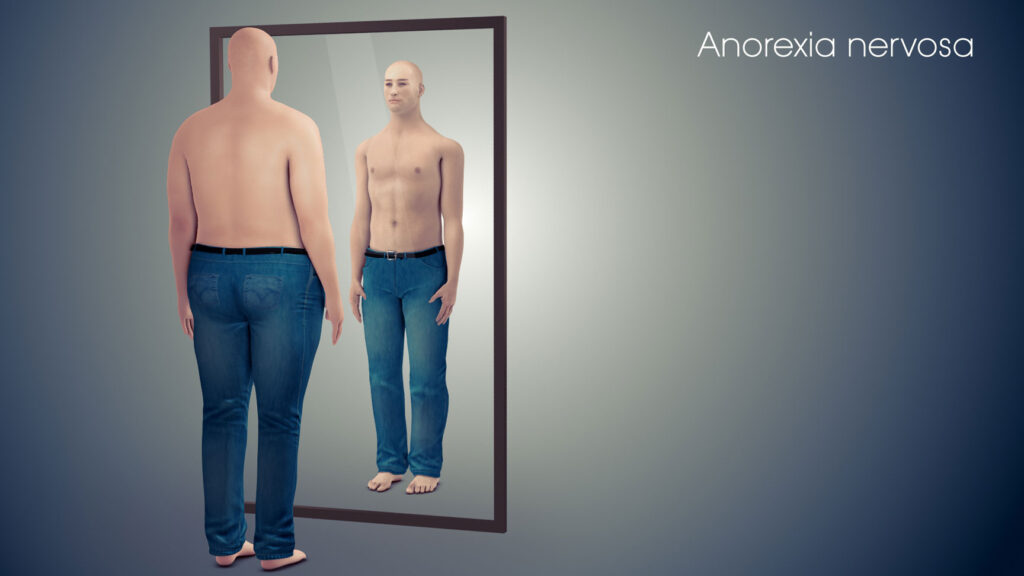WHAT IS ANOREXIA NERVOSA?
Anorexia nervosa — often simply known as anorexia — is an eating disorder characterized by abnormally low body weight, an intense fear of gaining weight, and a distorted perception of weight. People with anorexia place a high value on controlling their weight and shape, using extreme efforts that tend to significantly intermeddle with their lives.
To prevent weight gain or to continue losing weight, people with anorexia generally severely restrict the amount of food they eat. They might control calorie intake by vomiting after eating or by misusing laxatives, diet aids, diuretics, or enemas. They might also attempt to lose weight by exercising excessively. It does not matter how much weight is lost; the person continues to fear weight gain.
Anorexia is not really about food. It is an extremely unhealthy and sometimes life-threatening way to try to cope with emotional issues. When you suffer from anorexia, you often equate thinness with self-worth.
Anorexia, like other eating disorders, could take over your life and can be very difficult to overcome. But with treatment, you can gain a better sense of who you are, return to healthier eating habits and reverse some of anorexia’s severe complications.
SYMPTOMS
The physical signs and symptoms of anorexia nervosa are associated with starvation. Anorexia also includes emotional and behavioral problems involving an unrealistic perception of body weight and an extremely strong fear of gaining weight or becoming fat.
It might be difficult to notice signs and symptoms because what is considered a low body weight is different for each person, and some individuals might not appear extremely thin. Also, people with anorexia often disguise their thinness, eating habits, or physical issues.
Physical symptoms
Physical signs and symptoms of anorexia might involve:
- Extreme weight loss or not making desired developmental weight gains
- Thin appearance
- Abnormal blood counts
- Fatigue
- Insomnia
- Dizziness or fainting
- Bluish discoloration of the fingers
- Hair that thins, breaks, or falls out
- Soft, downy hair covering the body
- Absence of menstruation
- Constipation and abdominal pain
- Dry or yellowish skin
- Intolerance of cold
- Irregular heart rhythms
- Low blood pressure
- Dehydration
- Swelling of arms or legs
- Eroded teeth and calluses on the knuckles as a result of induced vomiting
Some people who suffer from anorexia binge and purge, similar to individuals who have bulimia. But people with anorexia usually struggle with abnormally low body weight, while individuals with bulimia typically are normal to above normal weight.
Emotional and behavioral symptoms
Behavioral symptoms of anorexia might include attempts to lose weight by:
- Severely limiting food intake via dieting or fasting
- Exercising excessively
- Bingeing and self-induced vomiting to get rid of food, which might include the use of laxatives, enemas, diet aids, or herbal products
Emotional and behavioral signs and symptoms might include:
- Preoccupation with food, which sometimes involves cooking elaborate meals for others but not eating them
- Frequently skipping meals or refusing to eat
- Denial of hunger or making excuses to avoid eating
- Eating only a few certain “safe” foods, generally those low in fat and calories
- Adopting rigid meal or eating rituals, like spitting food out after chewing
- Not wanting to eat in public
- Lying about how much food you consume
- Fear of gaining weight that might include repeated weighing or measuring the body
- Frequently checking in the mirror for perceived defects
- Complaining about getting fat or having parts of the body that are fat
- Covering up in layers of clothing
- Flat mood (lack of emotion)
- Social withdrawal
- Irritability
- Insomnia
- Reduced interest in sex
WHEN SHOULD YOU SEE A DOCTOR?
Unfortunately, many people with anorexia do not want treatment, at least initially. Their desire to remain thin overrides troubles about their health. If you have a loved one, you are worried about, urge her or him to talk to a doctor.
If you are experiencing any of the problems listed above, or if you think you might have an eating disorder, get help. If you are hiding your anorexia from loved ones, try to find a person you trust to talk to about what is going on.
CAUSES
The exact cause of anorexia is not known. As with many diseases, it is likely a combination of biological, psychological, and environmental factors.
- Biological – Although it is not yet clear which genes are involved, there might be genetic changes that make some people at higher risk of developing anorexia. Some people might have a genetic tendency toward perfectionism, sensitivity, and perseverance — all traits related to anorexia.
- Psychological – Some people with anorexia might have obsessive-compulsive personality traits that make it easier to stick to strict diets and forgo food despite being hungry. They might have an extreme drive for perfectionism, which causes them to think they are never thin enough. And they might have high levels of anxiety and engage in restrictive eating to reduce it.
- Environmental – Modern Western culture puts the emphasis on thinness. Success and worth are frequently equated with being thin. Peer pressure might help fuel the desire to be thin, particularly among young girls.
RISK FACTORS
Anorexia is more frequent in girls and women. However, boys and men have increasingly developed eating disorders, possibly associated with growing social pressures.
Anorexia is also more frequent among teenagers. Still, people of any age could develop this eating disorder, though it is rare in those over 40. Teens might be more at risk because of all the changes their bodies go through during puberty. They might also face increased peer pressure and be more sensitive to criticism or even casual comments about weight or body shape.
Specific factors increase the risk of anorexia, including:
- Genetics – Changes in specific genes might put certain people at higher risk of anorexia. Those with a first-degree relative — a parent, sibling, or child — who had the disorder have a much greater risk of anorexia.
- Dieting and starvation – Dieting is a risk factor for the development of an eating disorder. There is strong evidence that many of the symptoms of anorexia are in fact symptoms of starvation. Starvation affects the brain and influences mood swings, rigidity in thinking, anxiety, and reduction in appetite. Starvation and weight loss might change the way the brain works in vulnerable individuals, which may perpetuate restrictive eating behaviors and make it difficult to return to normal eating habits.
- Transitions – Whether it is a new school, home, or job; a relationship breakup; or the death or illness of a loved one, the change could bring emotional stress and increase the risk of anorexia.
COMPLICATIONS
Anorexia could have numerous complications. At its most severe, it could be fatal. Death might occur suddenly — even when someone is not severely underweight. This might result from abnormal heart rhythms (arrhythmias) or an imbalance of electrolytes — minerals like sodium, potassium, and calcium that maintain the balance of fluids in your body.
Other complications of anorexia are:
- Anemia
- Heart problems, like mitral valve prolapse, abnormal heart rhythms, or heart failure
- Bone loss (osteoporosis), increasing the chance of fractures
- Loss of muscle
- In females, the absence of a period
- In males, decreased testosterone
- Gastrointestinal problems, like constipation, bloating, or nausea
- Electrolyte abnormalities, like low blood potassium, sodium, and chloride
- Kidney problems
If a person with anorexia becomes severely malnourished, every organ in the body could be damaged, including the brain, heart, and kidneys. This damage might not be fully reversible, even when the anorexia is under control.
In addition to the host of physical complications, people with anorexia also frequently have other mental health disorders as well. They might include:
- Depression, anxiety, and other mood disorders
- Personality disorders
- Obsessive-compulsive disorders
- Alcohol and substance misuse
- Self-injury, suicidal thoughts, or suicide attempts
PREVENTION
There is no guaranteed way to prevent anorexia nervosa. Primary care physicians (pediatricians, family physicians, and internists) might be in a good position to identify early indicators of anorexia and prevent the development of full-blown illness. For instance, they could ask questions about eating habits and satisfaction with appearance during routine medical appointments.
If you notice that a family member or friend has low self-esteem, severe dieting habits, and dissatisfaction with appearance, consider talking to him or her about these problems. Although you might not be able to prevent an eating disorder from developing, you can talk about healthier behavior or treatment options.
DIAGNOSIS
If your doctor suspects that you have anorexia nervosa, he or she will generally do several tests and exams to help pinpoint a diagnosis, rule out medical causes for the weight loss, and check for any associated complications.
These exams and tests generally involve:
- Physical exam – This might include measuring your height and weight; checking your vital signs, like heart rate, blood pressure, and temperature; checking your skin and nails for problems; listening to your heart and lungs, and checking your abdomen.
- Lab tests – These might include a complete blood count (CBC) and more specialized blood tests to check electrolytes and protein as well as the functioning of your liver, kidney, and thyroid. A urinalysis also might be done.
- Psychological evaluation – A doctor or mental health professional will probably ask about your thoughts, feelings, and eating habits. You might also be asked to complete psychological self-assessment questionnaires.
- Other studies – X-rays might be taken to check your bone density, check for stress fractures or broken bones, or check for pneumonia or heart problems. Electrocardiograms might be done to look for heart irregularities.
Your mental health professional also might use the diagnostic criteria for anorexia in the Diagnostic and Statistical Manual of Mental Disorders (DSM-5), published by the American Psychiatric Association.
TREATMENT
Treatment for anorexia is usually done using a team approach, which includes doctors, mental health professionals, and dietitians, all with experience in eating disorders. Ongoing therapy and nutrition education are highly crucial to continued recovery.
Here is a look at what is commonly involved in treating people with anorexia.
Hospitalization and other programs
If your life is in immediate danger, you might need treatment in a hospital emergency room for such issues as heart rhythm disturbance, dehydration, electrolyte imbalances, or a psychiatric emergency. Hospitalization might be required for medical complications, severe psychiatric problems, severe malnutrition, or continued refusal to eat.
There are clinics that specialize in treating people with eating disorders. They might offer day programs or residential programs rather than full hospitalization. Specialized eating disorder programs might offer more-intensive treatment over longer periods of time.
Medical care
Because of the host of complications anorexia causes, you might need frequent monitoring of vital signs, hydration level, and electrolytes, as well as related physical conditions. In severe cases, people with anorexia might initially require feeding through a tube that is placed in their nose and goes to the stomach (nasogastric tube).
Care is generally coordinated by a primary care doctor or a mental health professional, with other professionals involved.
Restoring a healthy weight
The main goal of treatment is getting back to a healthy weight. You cannot recover from anorexia without returning to a healthy weight and learning proper nutrition. Those involved in this process might include:
- Your primary care doctor, could provide medical care and supervise your calorie needs and weight gain
- A psychologist or other mental health professional, who could work with you to develop behavioral strategies to help you return to a healthy weight
- A dietitian, who could offer guidance in getting back to regular patterns of eating, including providing specific meal plans and calorie requirements that help you meet your weight goals
- Your family, who will probably be involved in helping you maintain normal eating habits
Psychotherapy
These types of therapy might be beneficial for anorexia:
- Family-based therapy – This is the only evidence-based treatment for teenagers affected by anorexia. Because the teenager with anorexia is unable to make good choices about eating and health while in the grips of this severe condition, this therapy mobilizes parents to help their child with re-feeding and weight restoration until the child could make good choices about health.
- Individual therapy – For adults, cognitive behavioral therapy — specifically enhanced cognitive behavioral therapy — has been found to be helpful. The main aim is to normalize eating patterns and behaviors to support weight gain. The second aim is to help change distorted beliefs and thoughts that maintain restrictive eating.
Medications
None of the medications are approved to treat anorexia because none has been found to work very well. However, antidepressants or other psychiatric medications can help treat other mental health disorders you may also have, like depression or anxiety.
Treatment challenges in anorexia
One of the biggest challenges in treating anorexia is that people might not want treatment. Barriers to treatment might include:
- Thinking you do not need treatment
- Fearing weight gain
- Not seeing anorexia as a disease but instead as a lifestyle choice
People with anorexia could recover. However, they are at increased risk of relapse during periods of high stress or during triggering situations. Ongoing therapy or periodic appointments during times of stress might help you stay healthy.
If you or anyone you know is suffering from anorexia nervosa, our expert providers at Specialty Care Clinics will take care of your health and help you recover.
Call 469-545-9983 to book a telehealth appointment for an at-home check-up.




